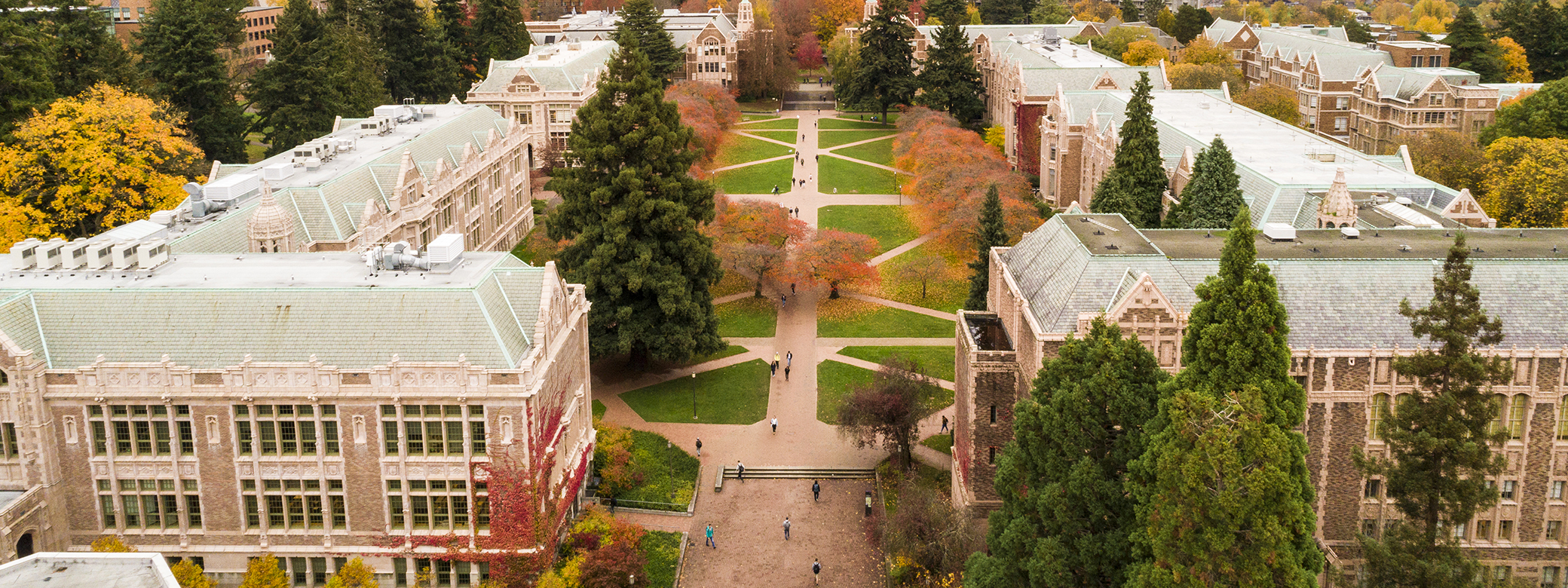The College of Arts & Sciences is pleased to celebrate the many awards and honors that faculty and staff have received over the past few months for their research, leadership, teaching, and other accomplishments. Congratulations to all!
Law, Societies & Justice Earns Luminary Award
by Kathrine Braseth
In the realm of criminal justice, the UW’s Department of Law, Societies, and Justice (LSJ) stands out. As a testament to their noteworthy leadership, LSJ was recently recognized with the 2023 Luminary Award from the Seattle Clemency Project (SCP).
SCP selected LSJ “in recognition of [the department’s] efforts to use the power of interdisciplinary liberal arts education to promote a greater understanding of the meaning of justice, the methods used in efforts to realize it, the politics of rights, and the complex roles that law and legal institutions play in structuring social life.” In particular, the award pays honor to LSJ’s remarkable contributions in raising awareness of the excessive use of long prison sentences in Washington and advocating for meaningful reforms — issues at the heart of SCP’s work.

SCP acts as a bridge, connecting individuals seeking early release from prison, and those grappling with deportation due to past criminal convictions, with free and high-quality legal representation. SCP has partnered with LSJ through the Juvenile Parole Project, an LSJ program through which students collaborate with pro bono attorneys who provide crucial support to incarcerated individuals in Washington facing post-conviction hearings. This collaboration has made a tangible difference in the lives of individuals convicted as juveniles and subjected to life or lengthy prison sentences.
Katherine Beckett, Chair and Professor of LSJ, expressed her enthusiasm about the partnership with the Seattle Clemency Project for its transformative and deeply rewarding impact on both students and faculty alike. "We are profoundly thankful for the opportunity to learn and work together as we collectively seek to illuminate the path to justice," says Beckett.
We are profoundly thankful for the opportunity to learn and work together as we collectively seek to illuminate the path to justice.
Brooke Kaufman (BA, LSJ, 2021), who worked on the Juvenile Parole Project for more than a year, remembers her experience as more than just hands-on learning. She describes the Juvenile Parole Project as a way that abstract concepts of ‘what is just’ and ‘what is unfair’ translate into stories of real people.
“In one of my first LSJ classes, we learned about the concept of social history and how understanding a person’s past can lead us to make better judgments on their decisions,” said Kaufman. “Storytelling is how we move beyond the binary of good and bad, giving us the language to paint people with the complexities they are owed.”
Reddy Named Freedom Scholar
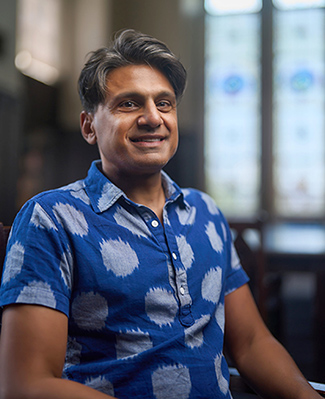
Chandan Reddy, associate professor of gender, women and sexuality studies and of the comparative history of ideas, has been named a Freedom Scholar by the Marguerite Casey Foundation. Each year, the Foundation honors six scholars nationwide for their work, to recognize scholarship “focused on shifting the balance of power in society to those who have long been excluded from having it and benefiting from its rewards.” Each honoree receives a $250,000 unrestricted grant.
Reddy specializes in challenging colonial systems, with a focus on migration and racialized genders and sexualities. Since 2022, Reddy has been a co-editor of "GLQ: A Journal of Lesbian and Gay Studies."
“So much of the economic inequality and violence we see today, especially within and by so-called liberal democratic states, derives from US, British, and European colonialism,” Reddy told UW News. “And like the struggle for abolition, or Palestinian and Indigenous sovereignty, anti-racist struggles for migrant justice or community efforts to build up queer and transgender of color lifeworlds are part of a larger struggle against this ongoing colonial present. And yet our structures of knowledge and universities like the UW have obscured this reality.”
Reddy holds affiliations with the Department of Geography, the Harry Bridges Center for Labor Studies, the South Asia Center in the Jackson School of International Studies, and is a board member of the UW Center for Human Rights. He plans to use the award to continue to work with local groups in the region and to complete a co-authored book.
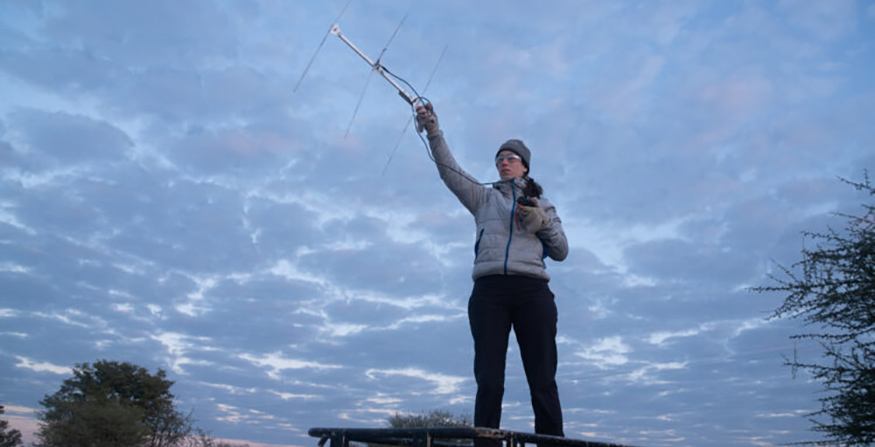
Abrahms Named Packard Fellow
Briana Abrahms, assistant professor of biology, Boersma Endowed Chair in Natural History and Conservation, and researcher with the UW Center for Ecosystem Sentinels, has been named a 2023 Packard Fellow for Science and Engineering by the David and Lucille Packard Foundation. She will receive $875,000 over five years for her research.
Abrahms studies how wildlife across the globe are changing behaviors in response to human-caused environmental change. Her research probes both the specific causes and consequences of behavioral changes, like altering migration routes, pursuing different food sources, and changing the timing of important life events such as breeding. She is particularly interested in how climate change is bringing large animals — from whales to lions — into more frequent contact with people. Abrahms and her team have shown that climate change is increasing human-wildlife conflicts globally.
“While we know that climate change is having profound impacts on both ecological and human communities, there is very little understanding of how these effects interact with one another,” said Abrahms. “The Packard Fellowship will allow my research group to push the boundaries of ecology to understand how species’ responses to environmental change are creating unforeseen feedbacks in the complex socio-ecological systems in which we all live.”
By analyzing diverse sources of data and modeling animal behavior, Abrahms and her team have started to pinpoint the causes and consequences of wildlife responses to environmental change and open the door to developing mitigation efforts. They also are developing new methods for sorting and analyzing large datasets, with projects that include leading expanded efforts to map whale-ship collision risk globally, especially as whale migration routes and feeding behaviors shift due to climate change.
Bender on TIME100 AI List
Emily Bender, professor of linguistics, was named to the first TIME100 AI list, which highlights 100 individuals who are advancing major conversations about how artificial intelligence (AI) is reshaping the world. The list features leaders, policymakers, artists and entrepreneurs across a variety of fields and countries.
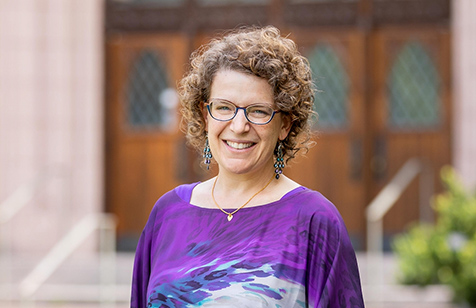
Bender has consistently raised ethical concerns regarding large language models and has resisted the notion that AI systems are truly intelligent. TIME called her “a machine-learning myth buster,” who is working to dispel “overblown promises about what AI can do.”
Among other topics, Bender studies the societal impacts of language technology, the implications for research and design, and how to integrate it into the natural language processing curriculum.
TIME points to her work highlighting the limitations of natural language processing when parsing languages other than English — a dangerous problem when, for example, emergency response systems depend on the technology but some callers aren’t understood due to shortcomings in language processing. “Bender has pushed researchers in the field to at least name the languages they’re using to develop their models, so as not to give the false and potentially harmful impression that these systems work equally across the non-English-speaking world,” TIME notes in its Bender profile, adding that “Bender has beat this particular drum so vigorously, in fact, it’s now known as the ‘Bender rule.’”
Also in the TIME100 AI list is Yejin Choi, professor in the UW's Paul G. Allen School of Computer Science & Engineering and a MacArthur Fellow. The full list of honorees is available on TIME’s website.
More Awards & Honors
Honorary Awards
Publication Awards
New Appointments to Professorships & Endowed Chairs
Other Recognition
Honorary Awards
Charles Campbell, professor emeritus of chemistry and B. Seymour Rabinovitch Endowed Chair in Chemistry, will be the 2024 recipient of the Gabor A. Somorjai Award for Creative Research in Catalysis from the American Chemical Society.
Sara Curran, professor of sociology, international studies, and public policy and governance, director of the Center for Studies in Demography and Ecology, and UW associate vice provost for research, was elected to the Washington State Academy of Sciences for her “groundbreaking work in demography and the sociology of migration, taking a multi-faceted approach that illuminates the dynamic interplay between demographic conditions and factors such as gender, socio-economic context, and climate change.”
Ana Mari Cauce, University of Washington President and professor of psychology, received a 2023 Decrees Award, granted annually by the Association of Friends of the Decrees to recognize people and institutions that add value to and promote the economic and social improvement of León, Spain. Cauce was honored for overseeing the launch of the UW León Center in 2010.
Gabriel Cler, assistant professor of speech and hearing sciences, was among the inaugural cohort receiving a Washington Research Foundation Ronald S. Howell Distinguished Faculty Fellows award. The purpose of the award is to catalyze the careers of early‐career faculty in science, technology, engineering, and mathematics fields and the inaugural recipients reflect "the breadth of outstanding neuroscience work at UW."
Janet Germeraad, academic services director, and Jason Patterson, senior academic counselor, both in the Department of Biology, were honored by the UW Association of Professional Advisers & Counselors as APAC Advisers of the Month. The Adviser of the Month award recognizes a UW adviser or student services professional who is doing great work or engaged in an exciting project. Germeraad and Patterson have supported thousands of students over the past 20 years in the Department of Biology.
Victoria (Vikki) Meadows, professor of astronomy, has been elected as a new fellow of the American Geophysical Union, which recognizes exceptional contributions to Earth and space sciences. Meadows’ research focuses on predicting, acquiring, and analyzing observations of planetary atmospheres and surfaces. In addition to studying planets within our solar system, she is interested in exoplanets — those outside the solar system — and how they might reveal the presence of life.
Patricia Moy, Christy Cressey Professor of Communication and associate vice provost for Academic and Student Affairs, received the Eleanor Blum Distinguished Service to Research Award from the Association for Education in Journalism and Mass Communication (AEJMC) for having devoted substantial parts of her career to promoting research in mass communication. Moy is a political communication scholar who focuses on how mediated and interpersonal communication can shape public opinion, citizens’ social and political trust, and political behavior.
Elise Novitski, assistant professor of physics, has received the Stuart Jay Freedman Award in Experimental Nuclear Physics from the American Physical Society. The award is presented annually to an outstanding early career experimentalist in nuclear physics. Novitski’s research uses precision low-energy experiments to investigate elementary particle properties and fundamental symmetries.
Aseem Prakash, professor of political science and Walker Family Professor for the College of Arts and Sciences, has been selected as a fellow of the National Academy of Public Administration. This prestigious honor recognizes significant contributions to public administration and policy, with recipients including cabinet officers, governors, mayors, legislators, and NGO leaders, as well as academic researchers and leaders.
David Alexander Rahbee, senior artist-in-residence and director of orchestral activities in the School of Music, won the American Prize—Vytautas Marijosius Memorial Award in Orchestral Programming (Collegiate Division), which recognizes and rewards the best achievement in the field of orchestral programming, where the selection of repertoire by knowledgeable, creative, and courageous music directors builds orchestras and audiences, educates young people and adults, and enriches the community.
Clark Sorensen, professor emeritus of international studies, received the 2023 Korea Foundation Award in recognition of his contributions to the promotion of Korean Studies in the United States.
Adam Summers, professor of biology, received the 2023 Meritorious Teaching Award in Ichthyology from the American Society of Ichthyologists and Herpetologists and the American Elasmobranch Society. The award recognizes superior teaching effectiveness and mentoring of students in the area of ichthyology.
Jessica K. Werk, associate professor of astronomy, was named a Blavatnik Award national finalist in Physical Sciences & Engineering. The Blavatnik Award recognizes America's most distinguished young scientists.
Publication Awards
Doug Ishii, assistant professor of English, was awarded honorable mention for the 2022 Norman Foerster Prize for Best Essay in the journal American Literature.
Emily Levesque, associate professor of astronomy, won the Chambliss Astronomical Writing Award from the American Astronomical Association for her graduate-level textbook, "Understanding Stellar Evolution.” The award recognizes astronomy writing for an academic audience, specifically textbooks at either the upper-division undergraduate or graduate level.
Suhanthie Motha, associate professor of English, was named editor-in-chief of Multilingual Matters’ "Critical Language and Literacy Studies" book series.
José Francisco Robles, associate professor of Spanish, won the 2022 Louis Gottschalk Prize for the best scholarly book on an eighteenth-century subject for his book Polemics, Literature, and Knowledge in Eighteenth-Century Mexico: A New World for the Republic of Letters. The Gottschalk Prize is awarded to one book annually by the American Society for Eighteenth-Century Studies.
Sasha Senderovich, associate professor of international studies and Slavic languages & literatures, received a National Endowment for the Humanities grant in NEH’s Scholarly Editions and Translations category for an annotated translation into English of a collection of Yiddish and Russian short stories written about the Soviet Jewish experience of World War II and the Holocaust.
Maya Sonenberg, professor of English, was a finalist for the Foreword INDIES Book of the Year Award for her book, Bad Mothers, Bad Daughters.
New Appointments to Professorships & Endowed Chairs
Daniel Bessner, associate professor of international studies, was appointed to The Anne H.H. and Kenneth B. Pyle Professorship in American Foreign Policy.
Bernard Deconinck, professor of applied mathematics and chair of the Department of Applied Mathematics, was appointed to the Boeing Professorship of Applied Mathematics.
Purnima Dhavan, associate professor of history, was appointed to the Giovanni and Amne Costigan Endowed Professorship in History.
Danny Hoffman, professor of international studies and director of the Jackson School of International Studies, was appointed to the Stanley D. Golub Endowed Chair.
Henry Jackson-Spieker, assistant professor of 3D4M in the School of Art + Art History + Design, was appointed to the Dale Chihuly Endowed Chair in Glass.
Raymond Jonas, professor of history, was appointed to the Jon Bridgman Endowed Professorship in History.
Joseph Marino, professor of Buddhist studies, was appointed to the Cris and Melissa Upton Cyders Professorship in Buddhist Studies.
Christian Novetzke, professor of international studies, was appointed to the Henry M. Jackson Professorship in International Studies.
Ema Perković, assistant professor of statistics, was appointed to the Dorothy Morrow Gilford Endowed Chair in Mathematical Statistics.
Adrian Raftery, professor of sociology and statistics, was appointed to the Blumstein-Jordan Endowed Professorship in Sociology.
David Rahbee, senior artist-in-residence in music, was appointed to the Adelaide D. Currie Cole Endowed Professorship in the School of Music.
Joshua Reid, professor of history, was appointed to the John Calhoun Smith Endowed Professorship.
Ileana Rodriguez-Silva, associate professor of history, was appointed to the Lawrence J. Roseman Endowed Professorship in History.
Thomas Rothvoss, professor of mathematics, was appointed to the Craig McKibben and Sarah Merner Endowed Professorship in Mathematics.
Stephen Rumph, chair and professor of music history, was appointed to the Adelaide D. Currie Cole Endowed Professorship in the School of Music.
Benjamin Schmidt, professor of history, was appointed to the Jon Bridgman Endowed Professorship in History.
Juliet Shields, professor of English, was appointed to the Joff Hanauer Distinguished Professorship in Western Civilization.
Maya Sonnenberg, professor of English, was appointed to the S. Wilson & Grace M. Pollock Professorship in Creative Writing.
Pimone Tripplet, professor of English, was appointed to the Professor Loren D. Milliman Distinguished Writer in Residence.
Charity Urbanski, teaching professor of history, was appointed to the Joff Hanauer Endowed Faculty Fellowship in History.
Melia Watras, chair of strings and professor of viola in the School of Music, was appointed to the Ruth Sutton Waters Endowed Professorship in Music.
Other Recognition
Liora R. Halperin, professor of international studies and history and Distinguished Endowed Chair of Jewish Studies, received the Lynda and Stewart Resnick Fellowship from the National Library of Israel. Awarded to senior international scholars working with the library's core collections, Halperin will use the fellowship to conduct work on her project, "Native Sons, Native Settlers: Memory and the Jews of Palestine Before Zionism."
Habiba Ibrahim, professor of English, was elected to the National Council of the American Studies Association.
Julie A. Kovacs, professor of chemistry, presented the Franklin Award Lecture at Stony Brook University. Through the lectureship, Stony Brook invites highly regarded scientists to share their expertise with the Stony Brook community.
Jennifer Nemhauser, professor in biology, was awarded an Andy Hill Cancer Research Endowment (CARE) Breakthrough Seed Funding Grant. The grant supports companies, entrepreneurs, innovators, and researchers who seek to explore and develop innovative ideas and strategies to substantially advance cancer research and care from etiology to survivorship.
Janelle Rodriques, assistant professor of English, was elected vice chair of the Society for Caribbean Studies.
Cristina Sánchez-Martín, assistant professor of English, and Taiko Aoki-Marcial, doctoral student in English, have been named 2023-2024 Public Humanities Fellows by Humanities Washington. They will create a digital project that collects and shares traditional stories from immigrant and refugee language learners in the Seattle area.
Casey Self, associate teaching professor of biology, and a team of her students, were awarded a UW Diversity Council's Diversity and Inclusion Seed Grant to support Anatomy for Change, a student-developed project in the Biology Department. The outreach program for minority pre-health students provides hands-on workshops within a cadaver lab to allow undergraduate students get into the mindset of a healthcare provider as they work through medical case studies.
Anu Taranath, teaching professor of English, was awarded the American Institute for Indian Studies Senior Researcher Fellowship.
Jesse Oak Taylor, associate professor of English, was selected for a Université Paris Cité Visiting Fellowship. Taylor was also named series editor of University of Virginia Press’s “Under the Sign of Nature” book series.
More Stories
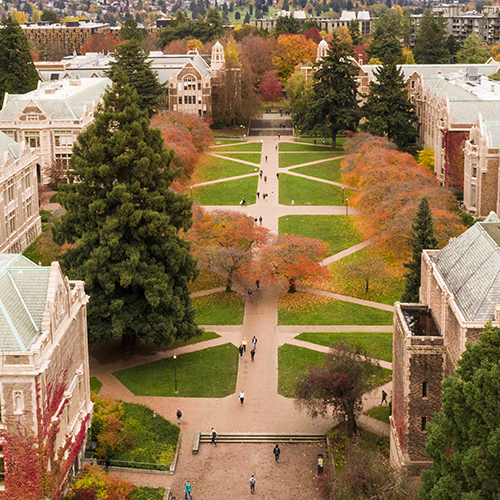
Awards for Research, Social Justice Efforts & More
Recent awards celebrate Arts & Sciences faculty, staff, and alumni for their research, social justice work, lifetime achievements, and more.
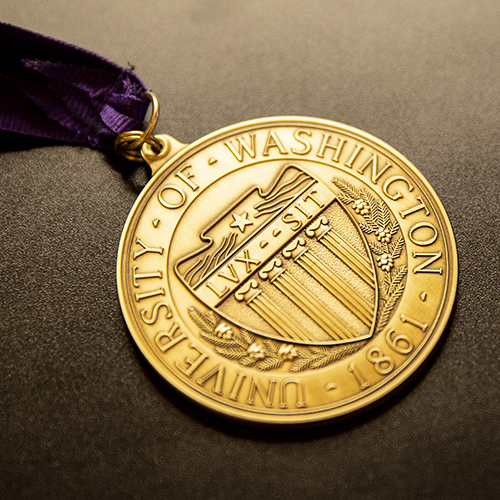
2025 UW Awards of Excellence
Arts & Science faculty and staff were among the recipients of 2025 UW Awards of Excellence for their teaching, leadership, and innovation.
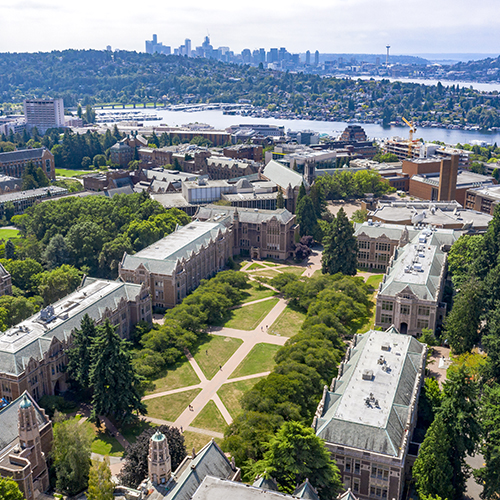
Honors for Impact, Innovation & More
Recent awards celebrate Arts & Sciences faculty, staff, and students for their research, leadership, and more.
